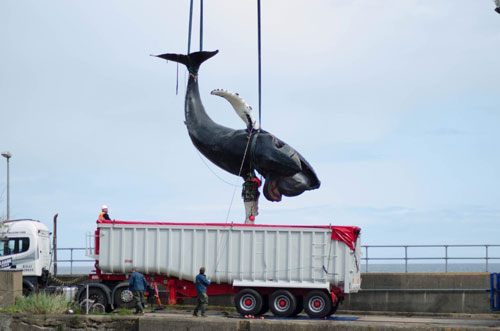SCIENTISTS hope to prove that Great White sharks are lurking in British waters by using as bait the body of a whale which died off the Scottish coast.

The decomposing hulk will be dragged hundreds of miles up the west coast of Britain with a tiny group of islands off Lewis the favourite location for “Jaws” to take a bite.
Cameras attached to the giant corpse will, it is hoped, record the first confirmed sighting off a Great White in UK seas.
A TV company got hold of the seven-ton female humpback in June after it got caught in creel ropes off the coast of Caithness and drowned.
It will now form part of a ground-breaking documentary, which will star TV personality Ben Fogle.
The giant body was transported from Caithness by truck to Shropshire in England, where it was stored for over two months.
It is understood that the boat towing the decomposing corpse will leave the north coast of Devon today (Friday).
Shark expert Richard Pierce, chairman of the Shark Conservation Society, confirmed he was going along as a specialist adviser.
He has investigated over 100 claims of Great White shark sightings in Britain but said less than 10% of them were credible.
He said: “The real question is why Britain does not have a Great White Shark population.
“There was a tooth washed up in a creel pot from 7,000 years ago.”
Richard said the Monach Islands off North Uist in the Outer Hebrides were his favourite spot for finally sighting a Great White.
He said: “The islands are home to 35,000 seals – mostly grey seals – and if you’re a Great White Shark that’s kind of a buffet.
“Our water temperature is spot-on, it’s perfect.”
He added that possible reasons for the lack of Great Whites were hunting, over-fishing and interruptions to food supply leading to sharks moving off to other waters and not returning.
He would not give any details of ITV’s filming plans, but admitted: “It’s quite exciting”.
The 7-ton female humpback died after its tail and body became wrapped in lines from fishing creels near Helmsdale harbour in Caithness two months ago.
Rescue teams had battled through the night to save the 9-metre whale, which was reported trapped by fishermen on 4th June.
But photos show the moment its body was lifted by a crane and dumped onto a truck three days later.
Netting, a creel and an orange buoy could be seen hanging from the creature’s mouth and ropes were tangled around it’s tail.
Alistair Jack, Scottish director of the British Marine Divers Life Rescue, who led the 12-strong rescue team said at the time: “We would normally decide how to dispose of it but a TV company took it.
“I believe they are going to freeze and sink it to film how the whole ecosystem interacts with it.
“They took it away on a truck. It wouldn’t explode, the ones that explode are deep-diving whales and it was lanced so it was no longer a risk.”
The show is expected to air on ITV in the autumn.